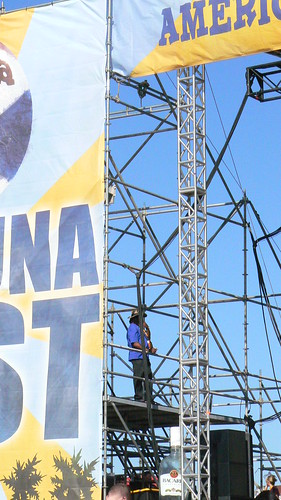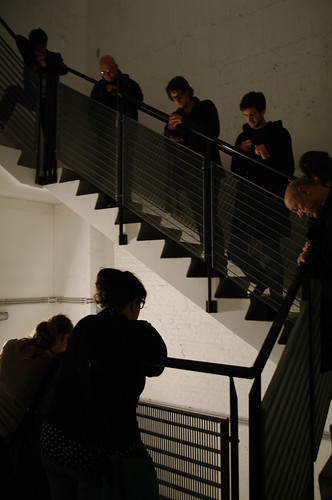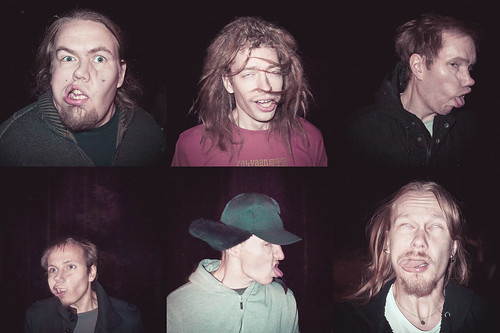
Image : http://www.flickr.com
What is a reggae "riddim?"
"Riddim" is the Jamaican Patois term for the instrumental "rhythm" track of a song, also known as the "groove" or the "beat". Jamaican popular songs, and many other types of Caribbean music, are built on riddims.
Riddims usually consist of a prominent bass line and a particular unique drum pattern and are truly the backbone of dub, reggae, lovers' rock, ragga, roots, dancehall, etc. Many riddims originate from a hit song and the riddim carries the name of the song, for example I-Wayne's 2004 hit "Lava Ground" on the Lava Ground Riddim. Or, in some cases, the riddim takes the name of the most popular song recorded on it. For example, the Satta Massagana Riddim is named after The Abyssinians' original song "Satta Massagana".
Occasionally, an artiste will voice two completely different songs on the identical riddim. And it's very common for different artistes to voice over the same riddims with different lyrics and different vocal styles, ranging from singing to toasting. For example, Jah Cure's "Call On Me", Gyptian's "Butterfly", and Tanya Stephens' "Reminiscing" are all on 2009's wonderful Good Love Riddim. The success of a riddim is judged by how many artistes "juggle" it, or make their own vocal interpretations of it. Jamaican audiences will judge whether or not the tune is big and, if so, other artistes will write new lyrics to "ride the riddim".
There can be more than a dozen popular current riddims, but there are usually only a few "hot" riddims at any given time. Artistes have to record over these hot riddims if they want a better shot at getting their songs played in the dancehalls or on the radio. Many times a dance is even created in honor of the riddim, like Pepperseed, or Gully Creeper, or who can forget the world's fastest man Usain Bolt's victory dance, "Nah Linga"?!!
The riddims don't always originate from reggae; some urban contemporary songs may become riddims as well. The instrumental of Ne-Yo's "Miss Independent" has become a popular riddim; many dancehall artists have recorded songs using the track. Other songs have inspired riddims too, such as George Michael's song "Faith," which became a riddim of the same name, and R. Kelly's "Snake," which became the Baghdad Riddim.
Types of riddims
Riddims are African in origin and are generally one of three types. The oldest, the "classical" riddim, provides the instrumentals for dub, roots reggae and lovers' rock (well known producers include Sly & Robbie). The "ragga" riddim backs (or used to back) raggamuffin and dancehall songs. And "digital" riddims (e.g., King Jammy's Sleng Teng Riddim) are created with computers, synthesizers and drum machines; in other words, they are really electronic riddims.
The advent of technology changed the entire business. No longer do you need to pay for studio time and hire musicians! This opened up the business to a whole new generation of producers, musicians and performers. Today, most riddims backing dancehall and Soca are digital. Digital riddims, along with the global reach and popularity of dancehall, have also spawned the creation of more and more popular riddims outside Jamaica.
Versioning
"Versioning" is the term for recycling or rejuvenating old riddims using computers and samplers, and voicing over them with new artistes. Jamaica has been versioning since the 1960s. Some of these riddims are decades old, many of them coming out of Clement "Coxsone" Dodd's renowned Kingston studio, Studio One. Some great riddims came out of Studio One in the '60s and '70s, and you will still hear them versioned in constant rotation by sound systems today.
Versioning can be controversial, however, because many of those who produced the original classic riddims never got paid for the riddims themselves. It would be nice to get some "royalties"!! But today's artists argue that they're inspired by these classics and paying respect by versioning and re-popularizing them. Many Jamaican producers rely heavily on versions although, in the past decade, we saw less of this practice with hundreds of creative new riddims being released.
The explosion of dancehall in recent years generated many great new riddims. But some are already being versioned as well. The Unfinished Business Riddim, popular in 2008, was a version of 1998's hit Showtime Riddim. So it seems old riddims never die!
Producers
Of course, creating a new and original riddim is far more difficult than versioning an old one! Here are some of the best original riddim producers from the past & present: Black Chiney (sound system, DJ, producer), Bobby "Digital B" Dixon (producer), Clement "Coxsone" Dodd (producer, Studio One records), Donovan Germain (producer, Penthouse Studio), Joe Gibbs (producer), King Jammy (dub mixer, producer), King Tubby (dub mixer, producer 1960s-1980s), Duke Reid (producer, Treasure Isle records, dominated the 1960s), Sly and Robbie (producers, Taxi Records), Steely & Clevie (producers).
Two of the hottest young producers of the new millennium share a surname but are not related. Stephen "Di Genius" McGregor, son of veteran singer Freddie McGregor, can boast of one of my favorite dancehall riddims of recent years, the Tremor Riddim (2007), voiced by Mavado ("Amazing Grace"), Sean Paul ("Watch Them Roll"), and others. This talented musician's riddims are so popular that more than a dozen people might voice over each of them.
The other young star producer is Kemar "Flava" McGregor, who is responsible for some of the hottest hits in recent years and, in my opinion, the very best roots reggae riddims to come out of Jamaica (or the world, for that matter) in years, for example: 2005's Triumphant Riddim (Gyptian's "Mama Don't Cry"), 2007's 83 Riddim (Richie Spice's "Ah No Me Dat" & Queen Ifrica's "Daddy"), and 2010's Classic Riddim (Pressure's "Thinking About You", Duane Stephenson & Ras Shiloh's "Soon As We Rise"), and Sweet Riddim (Etana's "Happy Heart", Beres Hammond's "See You Again", Ginjah's "Prayer"). I love the wide mix of artistes voicing his riddims - veterans and novices alike - definitely something to appeal to everyone. These two producers are out in front of Jamaica's current hitmakers!
For me, it's the smooth reggae beats that get me grooving and swaying; for others it's the hard bass lines they enjoy on the dancehall floor. No matter your preference, riddims are reggae music's foundation! Enjoy!
hero dota


